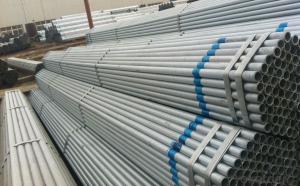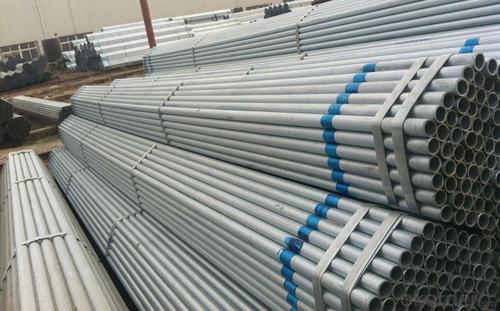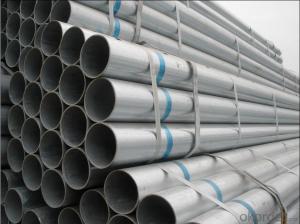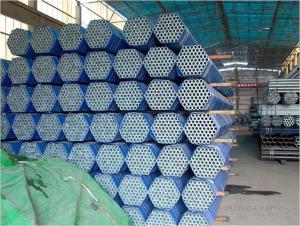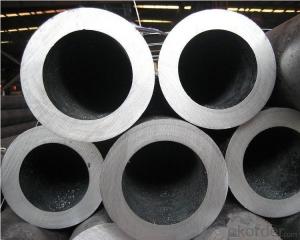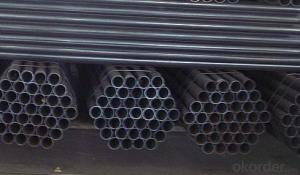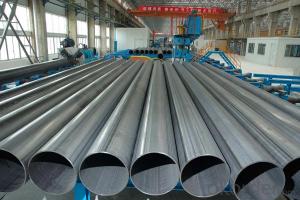Hot Galvanized Pipe For Building With BS 1387
- Loading Port:
- China Main Port
- Payment Terms:
- TT OR LC
- Min Order Qty:
- -
- Supply Capability:
- -
OKorder Service Pledge
OKorder Financial Service
You Might Also Like
O.D | O.D tolerance | W.T | Thickness Tolerance |
1/2-12'' | ±0.3mm | 1.5-12 MM | ±8% |
Length | 3m,4m,5.8m,6m or according customers' requirements | ||
Certificate | ISO9001-2008,EN10210,API,Raw material cert,Mill cert,Reap on site inspection report,SGS,BV | ||
Standard | ASTM A53/ASTM A36 BS1387/BS1139/EN39/EN10219/EN10217/EN10297/EN10296/EN10025 etc | ||
Material | Q195/215/235/345, SS330/400/500, S235JR/S235JQ/S235J2, etc | ||
Inspection | With Hydraulic Testing, Eddy Current , Infrared Test, etc | ||
Technique: | Welded Hot rolled,heat extrusion | ||
Packing | in bundle or in bulk, PVC in blue or in strip | ||
Usage | For construction, Pluid and Greenhouse | ||
Main market: | Middle east,North and South America, East and West Europe, South and southeast Asia,Australia,Africa, | ||
Place of Origin | China | ||
HS code: | 73063090 | ||
Productivity | 2000Ton/Month | ||
Processing | galvanzied,inner and outer stab clean,bevelled oiled,painted black threading,with coupling and plastic caps protected packing in plastic cloths,3PE,FBE,corrosion resistant coating | ||
- Q: How do steel pipes compare to ductile iron pipes?
- Steel pipes and ductile iron pipes have some similarities, such as being durable and strong materials for piping systems. However, there are a few key differences between the two. Steel pipes are typically lighter and more flexible, making them easier to handle and install. They also have a higher resistance to corrosion and can withstand higher pressure and temperature conditions. On the other hand, ductile iron pipes have a higher tensile strength and are more resistant to impact and vibration. Overall, the choice between steel and ductile iron pipes depends on specific project requirements, such as the intended application, location, and budget constraints.
- Q: Seamed steel pipe seamless steel pipe, carbon steel pipe, galvanized pipe, four how to distinguish between
- Welded and seamless steel pipe is divided according to the processing form, usually welded seam steel tube, seamless steel tube drawing and hot two ways, carbon steel is material, galvanized pipe is welded pipe production after the surface is galvanized
- Q: Can steel pipes be used for HVAC systems?
- Yes, steel pipes can be used for HVAC systems. Steel pipes are commonly used in HVAC systems for their durability, strength, and resistance to corrosion. They are suitable for transporting hot or cold air, water, or refrigerant throughout the system.
- Q: What are the different types of steel pipe connections for oil and gas pipelines?
- The different types of steel pipe connections for oil and gas pipelines include threaded connections, welded connections, and flanged connections. Threaded connections involve screwing the pipes together using a threaded end, which ensures a secure fit. Welded connections involve permanently joining the pipes together using welding techniques such as butt welding or socket welding. Flanged connections involve attaching flanges to the ends of the pipes and bolting them together, providing a strong and leak-proof connection.
- Q: SC15 what does galvanized steel pipe look like?
- DN15 galvanized pipe, nominal diameter of 15mm
- Q: How are steel pipes cleaned and maintained?
- Steel pipes are commonly cleaned and maintained through a variety of methods. Firstly, they are often cleaned using chemical solvents or detergents to remove any dirt, debris, or rust. This process is followed by rinsing the pipes thoroughly with water. Additionally, periodic inspections are conducted to identify any signs of corrosion or damage, which are then repaired promptly to prevent further deterioration. Lastly, applying protective coatings or paints on the pipes can help to enhance their longevity and prevent future corrosion.
- Q: Can steel pipes be used for hydropower generation?
- Indeed, the utilization of steel pipes is possible for the generation of hydropower. Within hydropower systems, steel pipes find widespread application in various contexts like penstocks and pipelines. Penstocks, characterized by their large size, are responsible for transporting water from a reservoir to a turbine, facilitating the conversion of the water's kinetic energy into rotational energy. Consequently, these pipes necessitate robustness and longevity to endure the immense water pressure and structural weight. Furthermore, steel pipes are also employed for pipelines, facilitating the transportation of water from the turbine back to the river or reservoir. Ultimately, steel pipes are an indispensable element in the generation of hydropower, as they possess the necessary strength, durability, and resilience to withstand the challenging conditions associated with water flow.
- Q: How do steel pipes handle abrasive materials?
- Steel pipes are highly resistant to abrasion and can effectively handle abrasive materials. The durable nature of steel allows it to withstand the erosive forces caused by abrasive particles, preventing damage and maintaining structural integrity. Additionally, steel pipes can be further protected by applying coatings or linings, enhancing their ability to handle even the most abrasive substances.
- Q: How are steel pipes used in the manufacturing of furniture?
- Steel pipes are commonly used in the manufacturing of furniture to provide structural support, such as in the construction of chair and table frames. They are also used as a base for attaching other materials, such as wood or fabric, and can be bent, shaped, and welded to create various designs and styles.
- Q: How are steel pipes used in the construction industry?
- Steel pipes are extensively used in the construction industry for a wide range of applications. They are primarily used for transporting various fluids and gases, such as water, oil, and natural gas, throughout the construction site or building. Steel pipes are also commonly used as structural elements in the construction of buildings, bridges, and tunnels, providing strength and stability to the structures. Additionally, steel pipes are utilized in the construction of plumbing systems, HVAC (heating, ventilation, and air conditioning) systems, and fire protection systems.
Send your message to us
Hot Galvanized Pipe For Building With BS 1387
- Loading Port:
- China Main Port
- Payment Terms:
- TT OR LC
- Min Order Qty:
- -
- Supply Capability:
- -
OKorder Service Pledge
OKorder Financial Service
Similar products
Hot products
Hot Searches
Related keywords
